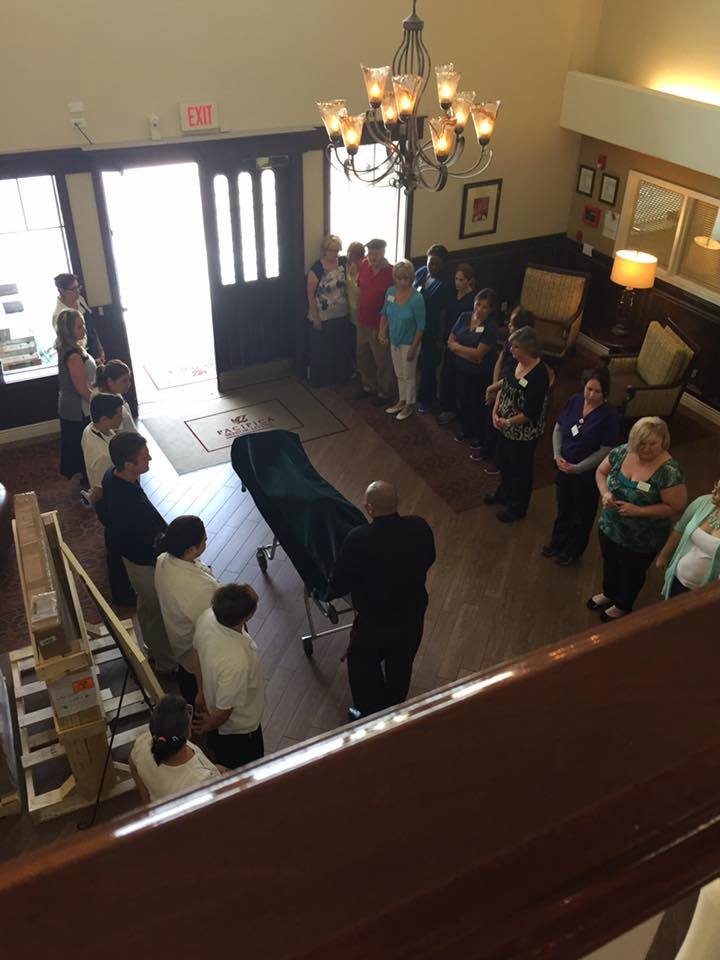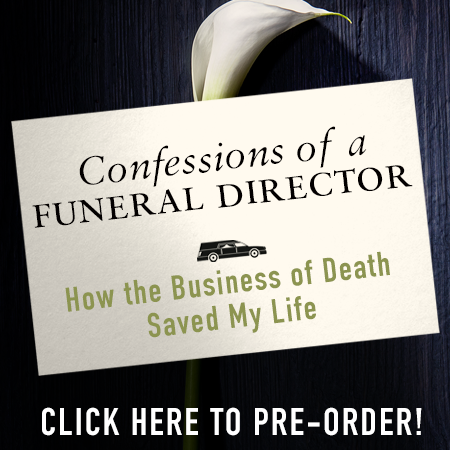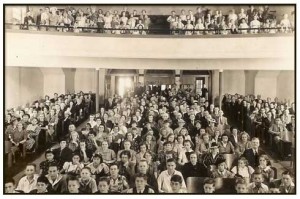Denial
Let’s Stop Throwing the Dead Out with the Trash

Most funeral directors will tell you that when you go to a hospital to pick up a deceased person, you’ll most likely park your removal van or hearse in the same area where the hospital throws out the trash.
The above photo montage is from three local hospitals in my area. In each case, we park the removal van at the same area where they take out the trash. Certainly, the hospitals aren’t implying that the dead are trash, but what they are implying is that both the body and the hospital’s trash should be hidden from the public view.
I want to contrast those pictures with this picture from Lisa B., who gave me permission me to share this photo:

Here are the context and the backstory behind this photo:
A couple months ago I shared a beautiful experience I had at a nursing home. As I shared in that post, when we funeral directors come to remove a deceased person from a nursing home, most nursing homes have a “hide the body” mentality or a “back door policy” that ushers the deceased out the back door so no one sees it.
As I’ve come to find out, some nursing homes have a “front door policy” where the death is acknowledged and the dead honored by the nursing home and its staff. My recent experience with this “front door policy” included the nursing staff creating a walk of honor. The staff lined the hallway walls as I left the nursing home with the deceased, acknowledging the life lived and lost.
When I shared my experience with the “front door policy” and the “walk of honor”, Lisa B. shared this beautiful photo of how her grandfather’s nursing home practiced this acknowledgment of death when her grandfather died. As you can see, the staff is creating this beautiful walk of honor to acknowledge the passing of Lisa’s grandfather as he leaves the nursing home. I asked Lisa if I could share the photo with you and she gave me permission.
This act, my friends, is a beautiful step away from death denial and towards death positivity.
Nursing homes who adopt the “front door policy” deserve all the praise in the world. And I think hospitals need to take notice. I’m not suggesting that hospitals adopt a “front door policy” because I’m not so naive to think that nursing homes and hospitals are similar spaces. They are not. But, they aren’t entirely different.
Finding ways to embrace our dead, instead of hiding them, is all a part of death positivity. We don’t need to fear our dead. We don’t need to hide them. We don’t need to be ashamed of them. Instead, we need to welcome the dead into our lives and allow them spaces among the living. However that looks at a hospital, I don’t know. But I do know that sending the dead out the same door as the trash isn’t it.
If you’re interested in more stories and thoughts like this, you might like to preorder my book:
Death Porn
There are two ways you can look at death as being pornographic. In the one sense, pornography is representative of something taboo. In the Victorian era sex was a taboo subject. Today, as some have argued, death is the new taboo … a taboo that we make a huge amount of effort to deny. Anthropologist Geoffrey Gorer said, “At present, death and mourning are treated with much the same prudery as sexual impulses were a century ago.”
Richard Beck wrote,
“the American success ethos is, at root, a neurotic defense mechanism involved in repressing death anxiety. The American culture is, thus, largely delusional and fictional, characterized by a fundamental dishonesty about our mortal condition. Americans pretend that they are immortal and have “all the time in the world.” Consequently, anything that punctures this illusion–disease, decay, debility or death–is pushed aside and avoided as unseemly and illicit. Hence the label “the pornography of death.”
Death as taboo pornography.
But there is another kind of death porn. Another way death and pornography are related. This other way isn’t through representation but through analogy.
Porno films have an intrinsically depersonalizing effect on those involved and those who watch. This commodity of sex has been shown to effect real life relationships in a variety of ways, most of which tend to be harmful. Just as “sex as commodity” can become harmful so can “death as commodity.”
Have you ever wondered why you can watch a gratuitous amount of violent deaths on TV and not be too particularly bothered by it? I’ve never lost sleep over a death on a TV show (although it was difficult when Lori died on The Walking Dead. And the Starks in Game of Thrones).
We play Black Ops on our game console and kill a couple dozen persons in one sitting without thinking about the fact that we are playing a game (A GAME!) where the objective is to kill as many people as we can. And the best gamer is the one who can kill the most.
We watch violence and gore on TV, in movies and remain relatively unaffected.
And this “unaffectedness” is because death has become a commodity. A thing. Something we can look at. Removed from person, and removed from emotion.
Death as a commodity is, in many ways, like pornography. It’s become something that we can safely substitute for the real thing. It’s all the visuals without the love, the trust, the grief and the person. Just as pornography is the commodity of sex without love, so our present grasp of death (via TV, video games, etc.) is death without person and without grief.
And yet, while violence is all throughout our TV shows and video games, we are really uneasy when we talk about the real thing. It’s all the gore without the grief, which – like sexual pornography – doesn’t always prepare us for the reality of death and the grief that comes with us.
Death porn can make us insensitive to a co-worker who is “grieving longer than he/she should”. “Shouldn’t Pat be over that death by now?” If all we know is death porn, then the answer is “Yes. Pat should be over that death by now.” With death, there are no “one night stands” but death porn makes us think there is.
When death becomes pornified, it becomes something that we should “shield the children from.” So, like we often do when talking about sex around our children, we bath our language with euphemisms.
Grandpa has been:
“Called home”
“Gone to a better place”
“Gone to glory”
And when someone dies in the family we make sure that our children don’t have to see it. We “block that channel.” We are so used to the scary fantasy of death that we don’t realize how much beauty, love and life is in real dying, real death and real grief.
Finally, we learn to do death in private. Sure, we might have a funeral (although funerals are become less and less of a social occasion), but we don’t want others to see us grieve. When a friend asks, “How are you?” we won’t say how much grief hurts, we won’t let our friend see our emotions; instead, we’ll say, “I’m fine.” And so we’ve denied it. We’re ashamed of it. We feel guilty. “I just don’t want to be a burden to them.” As though death and grief is something that should be kept away, hidden and private.
But death isn’t pornography. Death isn’t dirty. Death isn’t something we should deny. Like sex, in the context of love, death is full of beauty, love and life. What good sex is to a good relationship, so the good death is to a community. Death provides that experience where the community – despite our differences — can come together as one.
The pornification of death robs us all. It hurts us, hurts our relationships and hurts our community.
Comfort Cliches as Defense Mechanism
For Ernest Becker, the idea of transference is central to understanding the human condition. We are fallible and finite, destined to death and our works are destined to destruction. In order to escape these bleak, nihilistic feelings, humanity much find a person or object to which we can transfer our fear of death. A parent, so to speak, who can quell our fears by the might of their power. Once we have this person or object in place, we can find stability in knowing that our life can live on through them.
God, for instance, is an object/person where humanity places their fears, believing that He can enable meaning for life, rendering death meaningless. So, we ignore the harsh reality of death and dying through our conception of God. God enables our defense mechanism of transference. Which, I might add, isn’t an evil per se, but — like everything — can have unintended and hurtful consequences.
The other factor, says Becker, in understanding the human condition is repression. Repression, in the context of death denial, means the attempt to gain power as an immortality project, thus repressing our weakness in mortality. We can repress our fears, our insecurities, our finitude by finding building our own everlasting kingdom or symbol. And once our kingdom is established, we can live on, albeit, through our legacy of might, thus repressing the mortality reality.
Repression and transference are opposites: one seeks power for oneself (Becker and others call this “Eros”), while the other seeks to embed oneself in another (Becker calls this “Agape”). But, the two come together in perfect unison when we greet the bereaved family at a viewing and say something that both attempts to repress the reality of death and make it all better through religious verbiage.
The reason comfort clichés can be so offensive is that those who are experiencing grief have had their walls of repression and transference broken. They are sensitive to the reality of the human condition and the loneliness that comes with it. And here you come, attempting to minimalize their fears and pain with a cliché that’s meant more so to help you feel good than give real encouragement to the family.
When people use comfort cliches, they are often more concerned with comforting themselves than comforting the bereaved.
And when you’re throwing clichés around as a defense mechanism, the bereaved will often know … and this, my friends, is what they hear:
I don’t want to hear your story. I don’t want your pains to become a part of my life. My life is painful enough. It doesn’t need to be disturbed by your story.
Man, I can’t imagine your pain. In fact, I might be able to imagine your pain. Honestly, I don’t want to imagine your pain.
Your grief is your grief; it’s not mine. I can’t walk this dark path with you. Honestly, though, when I think about it, I could walk this path with you, I just don’t want to. My life is good right now. I like my view and I don’t like yours.
Here, instead of hearing you out and walking with you, I’m going to make myself feel good. It’s important that I still see myself as a good person. I’m not heartless, so let me make you a cake and leave it at your door.
Let me send you a card.
Let give you a Bible verse.
I think I read something about how time heals grief. Let me tell you that.
Let me tell you how God has plans in this death.
I need to tell you something, give you something so that I can feel good about myself. I can’t feel guilty, so I’ll half-ass comfort you so that I can feel good while you feel like shit.
“God is love.”
“Time will heal your wounds.”
“You can get through this.”
“You are still young … you can have more children.”
Defense mechanisms. All. In the Spector of death, we use them too much.
If we want to be good communicators with those experiencing death and dying, we need to recognize both the repression and transference in our own lives and silence them for the sake of the bereaved. Instead of denying the reality of death, accept it and listen to the grieving who are walking through it. Instead of trivializing death as something “God has overcome”, be willing to enter the loneliness that comes with grief. Enter the holy space of holy Saturday, and – at the risk of your faith – accept doubt and silence as real possibilities.
If you can’t do this … if you’re unwilling to do this, if you’re set on denying the reality of death, then do yourself and the bereaved a favor, and just stay away from it and those it’s touching.
Is God Your Crutch?
Death brings out the religiosity in all of us. If you’re a reader of my blog, you may realize that I’m rather critical of the whole God as Cosmic Santa Claus motif. AND, I’m rather critical of using God as the Grand Band Aid who fixes everything, including death. Somethings have no answer. Some valleys are dark.
I’m not the only one who is critical of the “God as crutch”. Freud, Marx et al; as well as a few Christians like Pete Rollins and, one of my favorite authors, Richard Beck are also critical of using God as a means to assuage our existential turmoil.
In The Authenticity of Faith, Beck suggest five strong beliefs for the believer who uses God as a defense mechanism / crutch / Grand Band Aid.
Here they are:
1. Special Protection: In the face of a hostile universe, the belief that God will especially protect the believer (and loved ones) from misfortune, illness, or death. The universe is existentially tamed.
2. Special Insight: In the face of difficult life decisions, the belief that God will provide clear guidance and direction. God’s guidance reduces the existential burden of choice.
3. Special Destiny: In the face of a life where meaning is fragile, the belief that God has created a special purpose for one’s life, a destiny that makes life intrinsically meaningful.
4. Divine Solicitousness: The belief that the omnipotent God is constantly available and interested in aiding the believer, even with the mundane and trivial. God is an eternal servant, our cosmic butler.
5. Denial of Randomness: In a life full of random, tragic, and seemingly meaningless events, the belief that God’s purpose and plan is at work. No event, however horrific or tragic, is existentially confusing or disconcerting. All is going according to plan.
Pages 158 – 159
These beliefs are meant to step in and remove or reduce the anxiety of the loss of our assumptive world. Together, they can form our crutch.
Do you use ALL of the above beliefs? Do you use SOME of the above beliefs?
5 Cultural Attitudes Toward Death
The following are large-scale cultural attitudes towards death.
These are taken verbatim from “Death and Dying, Life and Living”:
1. Tame Death: Death is familiar and simple; thatis, it is regarded as inevitable and not attempt is made to evade it. Persons who are dying typically calmly await their deaths, usually surrounded by loved ones and members of the community, all of whom wait peacefully for the end. In other words, death is a public event. A major focus of attention is the community; it is deeply affected by the loss of one of its necessary participants. Death is also seen as a sort of sleep; either one is awakened at some point to eternal bliss, or one remains eternally asleep.
2. Death of the self: The focus of attention is on the one who dies. Death produces great anxiety in that person because it is believed that one is either rewarded or punished in his or her future state. Death of the self involves a final testing period, and what one does at this moment determines what will happen to one after death (and indeed the meaning of one’s whole life). Several religious traditions have some such belief. For instance, some Jews believe that it is important at the moment of death to recite the Shema. Muslims are taught that invoking the Divine Name at the moment of death can be salvific. And some Buddhists hold that chanting the name of Amitabha Buddha at this point in one’s life will ensure that one will end up in the Pure Land after death. In the West, this attitude once led to the development of a formal ares moriendi, an art of dying well.

3. Remote and Imminent death: One’s attitude toward death is basically highly ambivalent. Death is viewed as a wholly natural event (not a supernatural one), but still great effort is made to keep it at a distance. It is both natural and dangerous, inviting and repelling, beautiful and to be feared.
4. Death of the other: Here, the main focus of attention is on the survivors. Death primarily involves the breaking of relationships. For survivors, it results in an intolerable separation from the one who dies. Feelings and behaviors may go nearly out of control (wailing, keening, throwing oneself in the grave, etc.). For the one who dies, death is primarily a period of waiting to be rejoined with loved ones in some other state.
5. Death denied / forbidden death: Death is seen as being dirty or indecent (even “pornographic). Thus, it is offensive to die in public. Dying persons are therefore more or less isolated from the rest of the community. The very fact that the person is dying is denied, both to that person and to those around her or him. Emotions, both before and after the death are to be kept hidden, and huts mourning may be seen as morbid or even pathological. (Pages 55 -56)
Here’s three questions:
Which attitude most describes your personal attitude towards death?
Which attitude are you least familiar with?
Which attitude do you think best describes the West?


